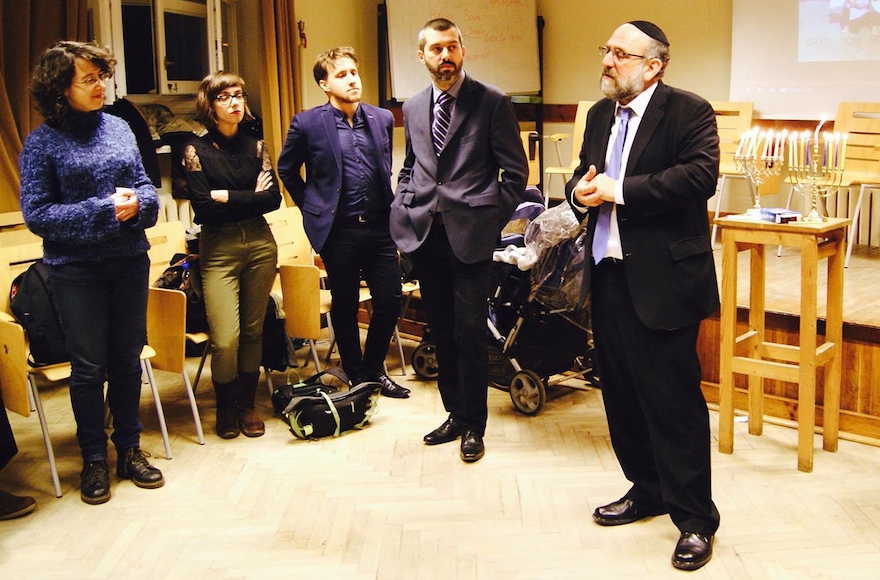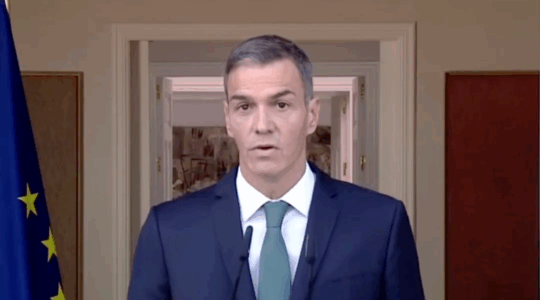(JTA) — If a Polish ultranationalist student intended to delegitimize his university’s main Hanukkah event, his plan seems to have backfired.
On Monday, on the Facebook invitation for a Hanukkah event at the University of Warsaw, Konrad Smuniewski inveighed against “Jew communists” and called Judaism a “criminal ideology” of “racism, xenophobia and hatred.”
His posts, however, generated a backlash that propelled the normally modest Hanukkah party at the university’s Judaic Department into the spotlight — garnering coverage in the Polish media that was highly critical of Smuniewski’s remarks and leading to a doubling in attendance at the event the following day.
“I cannot accept this sort of behavior, which I do not understand,” said Asia Bakon, 19, who is studying the history of arts and Hebrew, though she is not Jewish.
Bakon said she and approximately 40 other non-Jewish students came to the Hanukkah party for the first time this year “mainly out of solidarity over these hateful comments” by Smuniewski.
In a country where many left-wing liberals are accusing the rightist government of mainstreaming xenophobia since its rise to power last year, the anti-Semitic views expressed by Smuniewski — a devout Catholic and Donald Trump fan who studies history at the university — were particularly shocking to some of his critics because he couched them in pseudo-academic language.
“The phrase ‘Jew communists‘ is a scientific term. What’s offensive about it?” Smuniewski told the Gazeta Wyborcza newspaper, which many consider Poland’s daily of record, in a 600-word article on the incident published Wednesday.
Radio Zet, Warsaw’s first private radio station — its share of the national listenership is approximately 16 percent — also reported on the controversy.
In a statement on its website, the university said that a disciplinary committee is reviewing Smuniewski’s remarks following complaints.
To Bakon, Smuniewski’s decision to publish hate speech under his own name, and to then defend it in the national media, is typical of what she described as how rising nationalism in Poland is emboldening racists.
“I’m afraid this is connected to how nationalism has grown in Poland over the past four, five years,” she told JTA. “I see it as connected to events in Poland and around the world.”
Wojciech Karpieszuk, a journalist who covered the story for the left-leaning Gazeta Wyborcza, concurred.
“In my opinion this is related. The right-wing populism is on the rise in Poland now,” he told JTA. “And right-wing populists are more open to share with their views.”
Karpieszuk also said the incident touched a nerve at Warsaw University because of anti-Semitism there in the 1930s and during Poland’s communist years.
The incident is unusual because it involves Poland’s top-ranked university, but it comes amid a string of racist incidents in recent months, including the burning of a haredi Orthodox Jew effigy at an anti-immigration protest last year in the city of Wroclaw.
In its October report on hate crimes in Poland last year, the European Tolerance Center reported a decline in the prevalence of anti-Semitic discourse in Poland. Yet Poland’s Never Again Association, which tracks racist and xenophobic incidents in the country, revealed in September that it was getting reports of 10 racism incidents daily, whereas this used to be the weekly tally less than two years ago.
Amid rising tensions over immigration into the European Union by Muslims and fear over Russian expansionism, racist incidents recorded this year in Poland included the beating of a Syrian man on a Warsaw street; the barring of a black child from a playground in a town southeast of the capital and the formation of vigilante patrol groups to guard against possible illegal immigrants in Lodz, according to the Financial Times.
Government data show that 962 hate crimes were investigated in Poland last year — a 38 percent increase over 2014, the Financial Times reported in September.
“All too often we are disappointed by the lack of reaction to anti-Semitism,” said Michael Schudrich, the chief rabbi of Poland, who also attended the Hanukkah event at the university. “This time the reaction was quick and very clear in its condemnation of anti-Semitism. I am moved by the reactions of the university and of the students. All of Europe can learn from this response on how you can and must fight react against anti-Semitism and all forms of hatred.”
In Poland, there are some who connect the country’s hate crime problem with the political rhetoric of several of its leading politicians.
“Everything started with the electoral campaign” last year, Adam Bodnar, Poland’s commissioner for human rights, told the Financial Times. He was referring to the 2015 elections that ended with an upset victory for the nationalist conservative Law and Justice party under President Andrzej Duda.
“At that time those were not only statements but also demonstrations, hate speech, increase of hate on the internet,” Bodnar said.
These included remarks by Jaroslaw Kaczynski, a former prime minister and leader of Duda’s party, who warned that accepting Muslim refugees would “threaten Poland’s security.” This was a refined version of his remarks from before last year’s elections — that immigrants could bring “parasites” and “diseases.”
Zbigniew Ziobro, the country’s justice minister, meanwhile has said the Law and Justice party is the only defense against “Islamic districts in Poland.”
In July, Duda said at the commemoration of the Kielce pogrom, an outbreak of violence against Poland’s Jewish community in 1946, that in Poland “there is no place for any kind of prejudice, no place for racism, xenophobia, anti-Semitism.” Also last year, he said anti-Semites are “an insult” to non-Jews who risked their lives in Poland to save Jews from the Holocaust — a group also known as Righteous Among the Nations.
His government is responsible for directing unprecedented attention and honors for thousands of righteous gentiles, of which Poland has the highest number of any other country. Under Duda, Poland and Israel have pursued even friendlier ties.
But also under Duda, Holocaust revisionism has taken root in some of the country’s highest offices.
Defense Minister Antoni Macierewicz, whom the Anti-Defamation League last year said demonstrated “profound and virulent anti-Semitism” by defending the “Protocols of the Elders of Zion” forgery, claimed in July that Russians were responsible for the killings of Jews that mainstream historians attribute to Poles and Ukrainians.
And Jaroslaw Szarek, the president of Poland’s Institute of National Remembrance, said over the summer that the perpetrators of the Jedwabne massacre of Jews, which has been widely accepted as having been perpetrated by Poles, “were the Germans, who used in their own machine of terror a group of Poles.”
Meanwhile, Jan Gross, the Polish-American Jewish historian, is under a criminal investigation opened against him this year for saying that Poles killed more Jews during the Holocaust than Poles killed Germans. The probe was opened following complaints against Gross that alleged he broke a law that criminalizes insulting “the honor of the Polish Nation.”
Yet despite all these issues, “Poland is one of the best – if not the best – nations in Europe in which to be Jewish today,” Matthew Tyrmand, a columnist and son of the well-known Polish-Jewish writer Leopold Tyrmand, wrote in a recent op-ed, which the Warsaw Point published in April.
“In today’s Poland, violent anti-Semitic acts are few and far between,” he noted, adding: “In most large Polish cities there are now active synagogues, nonsectarian Friday night Sabbaths, lectures and the wearing of Jewish symbols such as the Star of David have become de rigueur.”
JTA has documented Jewish history in real-time for over a century. Keep our journalism strong by joining us in supporting independent, award-winning reporting.






